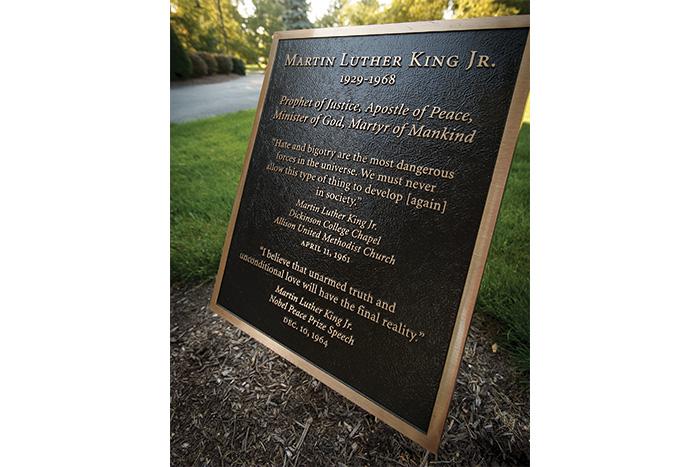Dedication: 'Learn to Live Together as Brothers or Perish as Fools'

by Erin Owens ’15
“Dr. King’s legacy was not just for himself,” says Paula Lima-Jones, director of the Office of Diversity Initiatives (ODI), “but it also inspired others to leave their legacies.” On April 11, Dickinson community members gathered in front of Allison United Methodist Church (UMC) to commemorate the life and impact of the Rev. Martin Luther King Jr. with a plaque dedication in his honor.
The plaque recognizes King’s 1961 visit to Dickinson as part of the college’s Representative American Preachers series. King’s sermon, “The Dimensions of a Complete Life,” exhorted all present to “learn to live together as brothers, or perish as fools.”
Two years before the historic March on Washington, King shared his rationale for, and commitment to, civil rights during that speech: “The cause is right, and we have cosmic companionship. Thus we can walk and never get weary.” To honor that walk, the plaque notes King as “Prophet of Justice, Apostle of Peace, Minister of God, Martyr of Mankind.” It also quotes from the speech: “Hate and bigotry are the most dangerous forces in the universe. We must never allow this type of thing to develop [again] in society.”
The recognition has been a long time coming, says Joyce Bylander, interim vice president for student development—beginning in 2011 with Corinthia Jacobs ’11’s research for the Africana studies course History of Blacks at Dickinson. Her research uncovered information about Noah Pinkney, who was a former slave, Civil War veteran and Carlisle entrepreneur. Pinkney became a Dickinson fixture, selling pretzels, sandwiches, ice cream, cakes and pies from under the steps of East College. In February, the college dedicated a plaque to him.
Frank Williams ’15, a student assistant in the ODI, continued Jacobs’ work and, with help from the staff of Archives & Special Collections, investigated King’s 1961 visit. “It was amazing,” says Williams, to find letters from King. This discovery, says Bylander, along “with a desire to make visible the history of Dickinson College and its impact on students throughout our history,” led to the decision to memorialize King’s visit.
“It’s not all about celebrating an African American man who did great work in the civil-rights movement,” asserts Lima-Jones. “It’s about the contemporary conversation.” Honoring King and engaging the Dickinson community in discussion is a continuation of the journey toward full diversity and inclusion, she says. “Whether you’re conscious of it or not, diversity is part of your experience,” she continues. “We all need to grow.”
Published July 24, 2013